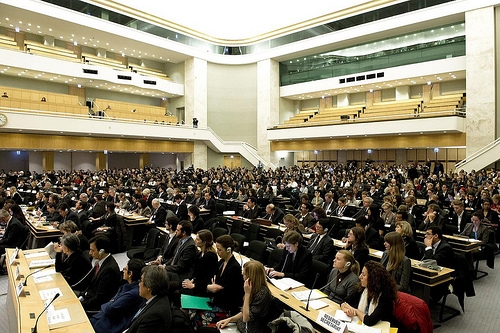
More than 18 months after endorsement of ‘Guiding Principles on Business and Human Rights’
SOMO’s recently published guide ‘How to use the UN Guiding Principles on Business and Human Rights in company research and advocacy’ was well received at the ‘United Nations Annual Forum on Business and Human Rights’ on 4 and 5 December in Geneva. During the ‘Challenges for Civil Society’ session held there and facilitated by SOMO − in collaboration with the Business and Human Rights Resource Centre (BHRRC) − common challenges and opportunities were formulated for NGOs in their work targeting the implementation of the Guiding Principles by companies and governments.
It was the first ‘United Nations Annual Forum on Business and Human Rights’ after the endorsement by the Human Rights Council, 18 months ago, of the recommendations of Professor Ruggie (Guiding Principles for the Protect, Respect and Remedy Framework). This signalled the cessation of Ruggie’s mandate and the creation of the UN Working Group on Business & Human Rights. At the same time an annual ‘multi stakeholder forum’ was established which at its first occurrence last 4 and 5 December, welcomed nearly thousand representatives from many states, universities, NGOs and companies.
Practical tips and methods
How to use the UN Guiding Principles on Business and Human Rights in company research and advocacy
The SOMO guide How to use the UN Guiding Principles on Business and Human Rights in company research and advocacy is a welcome initiative, as the many reactions from NGOs during the Forum showed.
“It is clear there is a need for a handy guide with practical tips and methods to help civil society organisations use the Guiding Principles to hold companies and governments accountable for complying with internationally recognised human rights and to monitor enterprises and governments in this area. The guide answers this need,” says SOMO researcher Mariëtte van Huijstee.
The guide is the second in a series of guides for civil society organisations published by SOMO. The first one is titled Multi-stakeholder Initiatives and appeared in March 2012.
The role of civil society organisations discussed
One of the sessions held during the Forum was called ‘Challenges in Implementation – The Role of Civil Society’. Its objective was to formulate common obstacles that many NGOs encounter in their work when trying to realise the ‘State Duty to Protect’ and the ‘Corporate Responsibility to Respect human rights’.
“Two important issues became clear in the session: 1) Human rights defenders are being criminalised. This deserves priority attention from the UN Working Group on Business & Human Rights as these people play a pivotal part in promoting the implementation of the Guiding Principles. 2) At a national level, states and enterprises are still too often failing to protect or respect human rights. The need for an international mechanism to tackle specific cases of abuse was made very apparent,” says van Huijstee.
No real dialogue at the forum
“The objective of this first forum was to enter a multi-stakeholder dialogue, to share lessons learnt and the various options related to the Guiding Principles, to be able to create more progress in the business and human rights arena. Unfortunately such sharing barely occured. The outcome of this forum may even be called disappointing. The perspectives and dilemmas of the different actors were discussed, but they did not engage each other because the set-up was not encouraging to enter into real dialogue. To live up to the mandate of this Annual Forum, it will have to be tranformed next time,’ opines van Huijstee.
Related content
-
 How to use the UN Guiding Principles on Business and Human Rights in company research and advocacyPosted in category:NewsPublished on:
How to use the UN Guiding Principles on Business and Human Rights in company research and advocacyPosted in category:NewsPublished on: -
How to use the UN Guiding Principles on Business and Human Rights in company research and advocacy Published on:Ricco, V.Posted in category:PublicationRicco, V.

-
Posted in category:How to use the UN Guiding Principles on Business and Human Rights in company research and advocacy?VideoPublished on:

